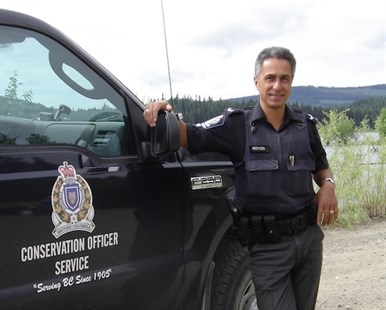
Greg Hoyer was a conservation officer in Kelowna for 20 years.
Image Credit: Contributed
May 08, 2015 - 7:34 PM
“YOU CAME TO WORK EVERY DAY KNOWING YOU COULD NOT FULFILL EVERY PHONE CALL AND REPORTED COMPLAINT”
KELOWNA - Retired B.C. conservation officer Greg Hoyer went into the field to protect fisheries and wildlife; by the time he left in 2009 that was only a fraction of his job.
“Over the years, the government just kept adding more hats, more responsibilities,” Hoyer says. “It was over and above what we initially started with back in the day.”
When Hoyer started in the 1970s, conservation officers were responsible for enforcing two pieces of legislation: the Fisheries Act and the Wildlife Act. By the time he was transferred to Kelowna in 1988 though, his job was becoming more and more of a balancing act. Over time, officers were handed the responsibility of enforcing the Waste Management Act, Water Act, Pesticide Control, Liquor Control Act and Motor Vehicle Act, all of which left less time for what they originally signed on for, Hoyer says.
Hoyer admits some of it made sense; if officers were out patrolling lakes for fishing violations, they might as well have the authority to check for boating infractions, like not having enough life jackets, or operating a vessel while impaired.
“It’s a natural fit, but were they going to resource it? That’s always been the issue. They kept adding those responsibilities because they thought, ‘Theres already an enforcement agency in place, let them do it,’” he says.
For his first two years in Kelowna, Hoyer was the sole conservation officer. In 1990, he got a second officer, and for the next 15 years it was just the two of them. A third was added in 2005, and that’s where the staffing level has stayed.
“Yet our responsibilities were increasing. Our population was increasing. The demand for our services was increasing,” Hoyer says. “You came to work every day knowing you could not fulfill every phone call and reported complaint.”
It came down to prioritization, and a lot of tough decisions, he says. On a typical day, a conservation officer might be called about a nuisance bear, poaching report, or chemical waste violation, and will have to decide what to focus on.
“You’re always juggling, trying to find out which of these is the most important. Inevitably, when you only have X amount of manpower, the lower files get dumped, there’s just no time to deal with them. That’s just a fact of life that you have to live with,” he says.
According to a 2007 report by West Coast Environmental Law, between 1995-2005 the number of enforcement actions by the conservation service plummeted by half, likely a symptom of a workforce stretched too thin.
As a retired conservation officer, Hoyer has more freedom to speak candidly about the realities of the job, but says he did raise his concerns while employed, just through different avenues. But he says those concerns were “lost as they went up the chain.”
A June 2011 report by then chief conservation officer Edward Illi concluded the conservation service “does not have adequate uniformed officers deployed throughout B.C.” and called for an increase of 40 officers.
Infonews.ca requested an interview with the Ministry of Environment about staffing levels in the conservation service but did not hear back by deadline. We asked the Ministry for the current number of officers in B.C. but didn’t get that information either. Ministry staff told the Province in a May 5 article there are 148 sworn conservation officers, although it appears 16 of those aren’t regularly in the field, and at least another 12 are vacant positions.
A search in the B.C. government directory, however, lists only 86 conservation officers, including two in Kamloops, two in Penticton, two in Vernon and three in Kelowna.
To contact the reporter for this story, email Charlotte Helston at chelston@infonews.ca or call 250-309-5230. To contact the editor, email mjones@infonews.ca or call 250-718-2724.
News from © iNFOnews, 2015